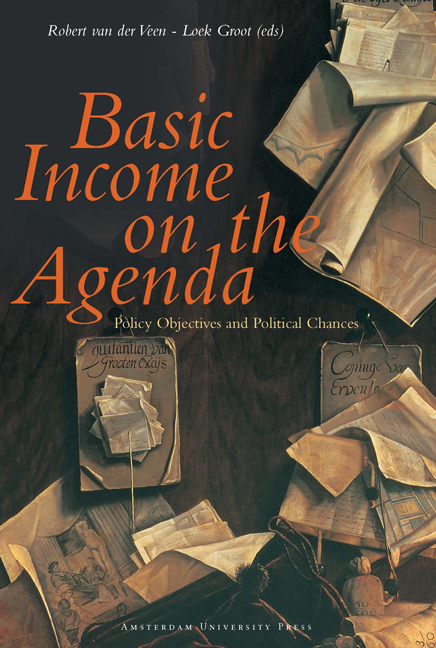Basic Income and its Cognates: Partial Basic Income versus Earned Income Tax Credit and Reductions of Social Security Contributions as Alternative Ways of Addressing the ‘New Social Question’
Published online by Cambridge University Press: 23 January 2021
Summary
At least three types of transfer policies have been advocated as ways of fighting unemployment without worsening poverty: reductions of social security contributions, the earned income tax credit, and an unconditional basic income (possibly in the form of a negative income tax). Many proponents of some of these are passionate opponents of some of the others. Yet, in the institutional context of much of today's Western Europe and within some broad limits, each of them can, in principle, be so calibrated as to generate exactly the same profile of tax rates and the same pattern of disposable incomes as the corresponding variant of each of the other two. So, despite all the heat, is there nothing to choose between?
Not quite. For beyond the prima facie equivalence, a closer look reveals important, sometimes unexpected differences between the three policies. These differences concern, for example, the impact of the policies on the unemployment trap, on the development of self-employment and informal work, on the accumulation of human capital, on workers’ bargaining power, on Trade Union attitude and on political feasibility. Using a battery of simple graphs, the article spells out these differences and explores their significance.
Introduction: Full Employment without Poverty
Europe's new social question can be said to consist in an emerging dilemma between high unemployment and worsening poverty. This new social question arguably stems from the very solution that had been gradually developed, over the last century, for the old social question, the unsustainable inequality between capitalists and proletarians generated by the industrialization process. Along with public involvement in the accumulation of physical and human capital, the furthering of workers’ rights – most prominently in the form of collective bargaining, labour legislation and social insurance schemes – gradually turned full jobs from unavoidable toil into valuable assets. The resulting pattern of distribution seemed to be on the right track as long as access to a job and the entitlements associated with it – including, for example, extra child benefits in periods of involuntary unemployment or the right to a decent pension for a worker's widow without any employment record – were secured to the overwhelming majority of households.
- Type
- Chapter
- Information
- Basic Income on the AgendaPolicy Objectives and Political Chances, pp. 53 - 84Publisher: Amsterdam University PressPrint publication year: 2000
- 1
- Cited by



